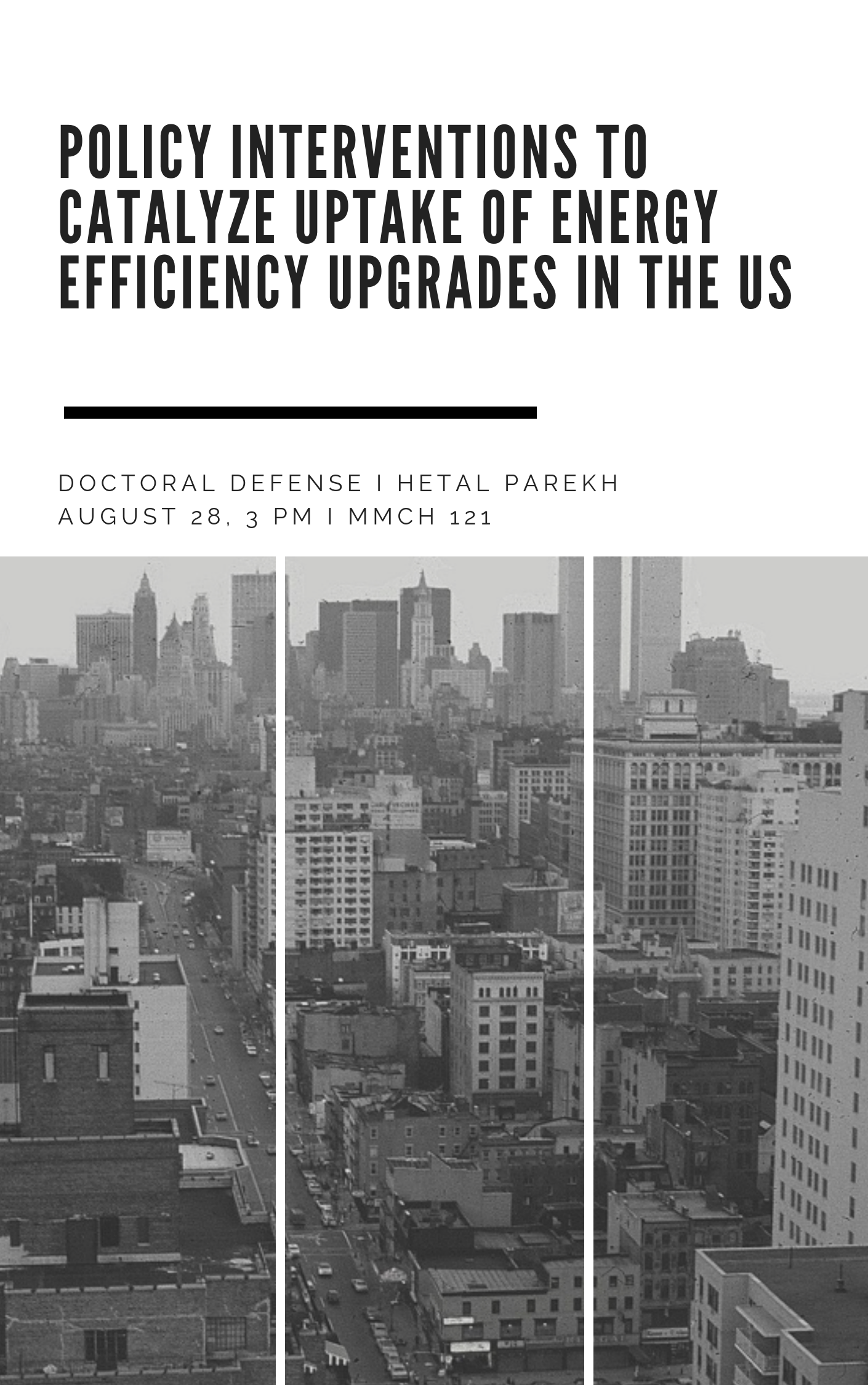Hetal Parekh will present the defense for her dissertation, "Policy Interventions to Catalyze Uptake of Energy Efficiency Upgrades in the US," to obtain the PhD in Building Performance & Diagnostics (PhD-BPD) on Wednesday 28 August. The Advisory Committee invites you to attend and hopes you will join them for this final step of her PhD Candidacy.
Title: “Policy Interventions to Catalyze Uptake of Energy Efficiency Upgrades in the US”
By Hetal Parekh, PhD-BPD Candidate
Date: Wednesday, 28 August 2019
Time: 3:00pm
Location: MMCH 121
PhD Advisory Committee
Dr. Erica Cochran-Hameen, Carnegie Mellon University (CMU); Chair
Dr. Aurora Sharrard, University of Pittsburgh
Dr. Nora Wang, Pacific Northwest National Laboratory (PNNL)
Dr. Deborah Stine, Science, Technology, and Innovation Policy Analysis & Education, LLC
Abstract
The U.S. commercial building energy retrofit market is estimated at $72 billion. If the commercial buildings pre-dating 1980 were retrofitted, energy use could be reduced by 30%, potentially resulting in $280 billion in energy savings over next 10 years. Despite this potential savings, the overall uptake of energy efficiency projects remains low in the US, due to multiple unaddressed market and non-market barriers.
This thesis is an extensive tripartite qualitative research into concerns about inaction by many commercial building decision makers and policy intervention to overcome this inaction. The first component in the thesis is a descriptive analysis identifying and analyzing the key barriers and then mapping policy tools to address each barrier. The chief finding from this analysis component is the need to overcome the knowledge barriers regarding external financing for energy retrofits. The second component is a policy analysis to evaluate existing policy mechanisms and possible alternatives. The chief finding from this analysis component is the viability of policy intervention through provision of financing decision support tools.
Building on the first two findings, the third component focuses on the formulation of a policy tool to effectively leverage resources for external financing through an aggregated, streamlined and simplified framework. Such a resource will provide decision makers with holistic support through the entire cycle - from understanding and identifying available programs, to assessing qualification and application process through its three modules:
Interface Module: Minimal user input and granular, simplified data output
Database Module: An aggregated repository of external financing program information
Process Module: Input dependent calculated fields for simplified cash-flow analysis
This research provides three main contributions to the literature, each representing one of three dissertation components. This dissertation provides:
Policy makers detailed insights into the barriers inhibiting commercial building decision makers from investing in energy retrofits.
Energy efficiency program designers with an evaluation of the impact of different policy efforts to address the barriers.
Commercial building decision makers with access to a policy tool in the form of a ‘retrofit financing decision support’ resource that comprises of the following:
A Simplified Economic Assessment Information: cash-flow & benefit-cost analysis for 14 external financing vehicles to commercial building decision makers, and
A Comprehensive external financing database to provide granular information by geography, building type, financing source and energy conservation method.
The findings from each component of the research is further substantiated through feedback from stakeholders in the form of focus group and semi-structured interviews. Based on the stakeholder feedback, the proposed program metrics can effectively help building owners, business owners and building managers navigate through what they view as a challenging financing process for energy retrofits.

